Fleurs du Mal Magazine


Or see the index
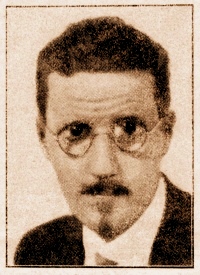
A Flower
Given to My Daughter
Frail the white rose and frail are
Her hands that gave
Whose soul is sere and paler
Than time’s wan wave.
Rosefrail and fair — yet frailest
A wonder wild
In gentle eyes thou veilest,
My blueveined child.
James Joyce
(1882-1941)
A Flower Given to My Daughter
• fleursdumal.nl magazine
More in: Archive I-J, Archive I-J, Joyce, James, Joyce, James
His Hands Were Gentle brings together, for the first time in both Spanish and English, the best of Víctor Jara’s lyrics, from early songs like ‘El arado’ to ‘Estadio Chile’ written in the hours before his execution there.
They reveal Jara as an ardent political poet, an eloquent advocate for the peasantry from which he arose, a socialist visionary and a poetic balladeer of the highest order.
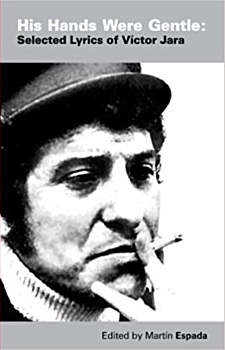 Translations by Martín Espada, Eduardo Embry, John Green, Joan Jara and Adrian Mitchell.
Translations by Martín Espada, Eduardo Embry, John Green, Joan Jara and Adrian Mitchell.
Foreword by Joan Jara, Preface by Emma Thompson, Introduction by Martín Espada.
Víctor Jara (1932–73) was a legendary Chilean singer, songwriter, guitarist and theatre director. Between 1966 and 1973 he released eight albums, such as Canto libre and El derecho de vivir en paz. He was a member of the Communist Party of Chile, a prominent supporter of Salvador Allende’s Popular Unity government, and a leader of the New Song Movement during the cultural renaissance of the Allende years. In the days following the US–backed military coup of September 11, 1973, Jara was arrested, imprisoned and murdered. His recordings were banned for many years in Chile.
On my way to work
I think of you,
through the streets of the town
I think of you,
when I look at the faces
through steamy windows
not knowing who they are, where they go…
I think of you
my love, I think of you
of you, compañera of my life
and of the future
of the bitter hours and the happiness
of being able to live
working at the beginning of a story
without knowing the end.
(…)
When I come home
you are there
and we weave our dreams together…
Working at the beginning of a story
without knowing the end.
(From: On My Way to Work/ Cuando voy al trabajo.
Translated by Joan Jara)
His Hands Were Gentle brings together, for the first time in both Spanish and English, the best of V¡ctor Jara’s lyrics, from early songs like ‘El arado’ to ‘Estadio Chile’ written in the hours before his execution there. They reveal Jara as an ardent political poet, an eloquent advocate for the peasantry from which he arose, a socialist visionary and a poetic balladeer of the highest order. Translations by Martin Espada, Eduardo Embry, John Green, Joan Jara and Adrian Mitchell.
His Hands Were Gentle
Selected Lyrics of Victor Jara
Martin Espada (Editor)
Translations by Martín Espada, Eduardo Embry, John Green, Joan Jara and Adrian Mitchell.
Foreword by Joan Jara,
Preface by Emma Thompson,
Introduction by Martín Espada.
Paperback
84 pages
Publisher: Smokestack Books
Bilingual edition
2014
Language: English
ISBN-10: 0956814417
ISBN-13: 978-0956814418
Price: £8.95
# more poetry
His Hands Were Gentle
Selected Lyrics of Victor Jara
fleursdumal.nl magazine
More in: # Music Archive, #Editors Choice Archiv, - Book News, Archive I-J, Art & Literature News
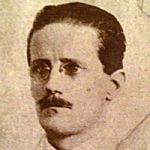
Be Not Sad
Be not sad because all men
Prefer a lying clamour before you:
Sweetheart, be at peace again — –
Can they dishonour you?
They are sadder than all tears;
Their lives ascend as a continual sigh.
Proudly answer to their tears:
As they deny, deny.
James Joyce
(1882-1941)
Be Not Sad
fleursdumal.nl magazine
More in: Archive I-J, Archive I-J, Joyce, James, Joyce, James

The Twilight Turns
The twilight turns from amethyst
To deep and deeper blue,
The lamp fills with a pale green glow
The trees of the avenue.
The old piano plays an air,
Sedate and slow and gay;
She bends upon the yellow keys,
Her head inclines this way.
Shy thought and grave wide eyes and hands
That wander as they list — –
The twilight turns to darker blue
With lights of amethyst.
James Joyce
(1882-1941)
The Twilight Turns
fleursdumal.nl magazine
More in: Archive I-J, Archive I-J, Joyce, James, Joyce, James

Lean Out of the Window
Lean out of the window,
Goldenhair,
I hear you singing
A merry air.
My book was closed,
I read no more,
Watching the fire dance
On the floor.
I have left my book,
I have left my room,
For I heard you singing
Through the gloom.
Singing and singing
A merry air,
Lean out of the window,
Goldenhair.
James Joyce
(1882-1941)
Lean Out of the Window
fleursdumal.nl magazine
More in: Archive I-J, Archive I-J, Joyce, James, Joyce, James
Drawing on draft manuscripts and other archival material, James Joyce and Absolute Music, explores Joyce’s deep engagement with musical structure, and his participation in the growing modernist discourse surrounding 19th-century musical forms.
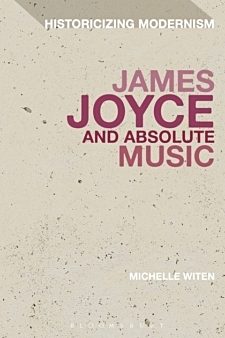 Michelle Witen examines Joyce’s claim of having structured the “Sirens” episode of his masterpiece, Ulysses, as a fuga per canonem, and his changing musical project from his early works, such as Dubliners and A Portrait of the Artist as a Young Man.
Michelle Witen examines Joyce’s claim of having structured the “Sirens” episode of his masterpiece, Ulysses, as a fuga per canonem, and his changing musical project from his early works, such as Dubliners and A Portrait of the Artist as a Young Man.
Informed by a deep understanding of music theory and history, the book goes on to consider the “pure music” of Joyce’s final work, Finnegans Wake.
Demonstrating the importance of music to Joyce, this ground-breaking study reveals new depths to this enduring body of work.
Towards a Modernist Condition of Absolute Music – Joyce’s Early Use of Music – Joyce’s fuga per canonem: A Case of Structure – Joyce’s fuga per canonem: A Case of Effect – Voided Fugue in “Circe” – “It’s Pure Music”: Finnegans Wake
Michelle Witen is Postdoctoral Teaching and Research Fellow at the University of Basel, Switzerland.
Michelle Witen
James Joyce and Absolute Music
Published: 22-02-2018
Format: Hardback
Edition: 1st
Extent: 320 p.
ISBN: 9781350014220
Imprint: Bloomsbury Academic
Series: Historicizing Modernism
Illustrations: 9 bw illus
Dimensions: 234 x 156 mm
RRP: £85.00
literature and music
fleursdumal.nl magazine
More in: # Music Archive, Archive I-J, Archive I-J, Art & Literature News, Joyce, James, Joyce, James

I Would in That Sweet Bosom Be
I would in that sweet bosom be
(O sweet it is and fair it is!)
Where no rude wind might visit me.
Because of sad austerities
I would in that sweet bosom be.
I would be ever in that heart
(O soft I knock and soft entreat her!)
Where only peace might be my part.
Austerities were all the sweeter
So I were ever in that heart.
James Joyce
(1882-1941)
I Would in That Sweet Bosom Be
fleursdumal.nl magazine
More in: Archive I-J, Archive I-J, Joyce, James, Joyce, James

Alone
The noon’s greygolden meshes make
All night a veil,
The shorelamps in the sleeping lake
Laburnum tendrils trail.
The sly reeds whisper to the night
A name– her name-
And all my soul is a delight,
A swoon of shame.
James Joyce
(1882-1941)
Alone
fleursdumal.nl magazine
More in: Archive I-J, Archive I-J, Joyce, James, Joyce, James

Love Came to Us
Love came to us in time gone by
When one at twilight shyly played
And one in fear was standing nigh — –
For Love at first is all afraid.
We were grave lovers. Love is past
That had his sweet hours many a one;
Welcome to us now at the last
The ways that we shall go upon.
James Joyce
(1882-1941)
Love Came to Us
fleursdumal.nl magazine
More in: Archive I-J, Archive I-J, Joyce, James, Joyce, James
A look back at the cultural and political force of Pulitzer Prize–winning poet Gwendolyn Brooks, in celebration of her hundredth birthday
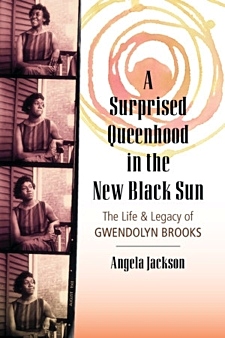 Pulitzer-Prize winning poet Gwendolyn Brooks is one of the great American literary icons of the twentieth century, a protégé of Langston Hughes and mentor to a generation of poets, including Sonia Sanchez, Nikki Giovanni, and Elizabeth Alexander.
Pulitzer-Prize winning poet Gwendolyn Brooks is one of the great American literary icons of the twentieth century, a protégé of Langston Hughes and mentor to a generation of poets, including Sonia Sanchez, Nikki Giovanni, and Elizabeth Alexander.
Her poetry took inspiration from the complex portraits of black American life she observed growing up on Chicago’s Southside—a world of kitchenette apartments and vibrant streets. From the desk in her bedroom, as a child she filled countless notebooks with poetry, encouraged by the likes of Hughes and affirmed by Richard Wright, who called her work “raw and real.”
Over the next sixty years, Brooks’s poetry served as witness to the stark realities of urban life: the evils of lynching, the murders of Emmett Till and Malcolm X, the revolutionary effects of the civil rights movement, and the burgeoning power of the Black Arts Movement. Critical acclaim and the distinction in 1950 as the first black person ever awarded a Pulitzer Prize helped solidify Brooks as a unique and powerful voice.
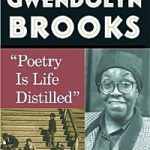 Now, in A Surprised Queenhood in the New Black Sun, fellow Chicagoan and award-winning writer Angela Jackson delves deep into the rich fabric of Brooks’s work and world. Granted unprecedented access to Brooks’s family, personal papers, and writing community, Jackson traces the literary arc of this artist’s long career and gives context for the world in which Brooks wrote and published her work. It is a powerfully intimate look at a once-in-a-lifetime talent up close, using forty-three of Brooks’s most soul-stirring poems as a guide.
Now, in A Surprised Queenhood in the New Black Sun, fellow Chicagoan and award-winning writer Angela Jackson delves deep into the rich fabric of Brooks’s work and world. Granted unprecedented access to Brooks’s family, personal papers, and writing community, Jackson traces the literary arc of this artist’s long career and gives context for the world in which Brooks wrote and published her work. It is a powerfully intimate look at a once-in-a-lifetime talent up close, using forty-three of Brooks’s most soul-stirring poems as a guide.
 From trying to fit in at school (“Forgive and Forget”), to loving her physical self (“To Those of My Sisters Who Kept Their Naturals”), to marriage and motherhood (“Maud Martha”), to young men on her block (“We Real Cool”), to breaking history (“Medgar Evers”), to newfound acceptance from her community and her elevation to a “surprising queenhood” (“The Wall”), Brooks lived life through her work.
From trying to fit in at school (“Forgive and Forget”), to loving her physical self (“To Those of My Sisters Who Kept Their Naturals”), to marriage and motherhood (“Maud Martha”), to young men on her block (“We Real Cool”), to breaking history (“Medgar Evers”), to newfound acceptance from her community and her elevation to a “surprising queenhood” (“The Wall”), Brooks lived life through her work.
Jackson deftly unpacks it all for both longtime admirers of Brooks and newcomers curious about her interior life. A Surprised Queenhood in the New Black Sun is a commemoration of a writer who negotiated black womanhood and incomparable brilliance with a changing, restless world—an artistic maverick way ahead of her time.
What shall I give my children? who are poor,
Who are adjudged the leastwise of the land,
Who are my sweetest lepers, who demand
No velvet and no velvety velour;
But who have begged me for a brisk contour,
Crying that they are quasi, contraband
Because unfinished, graven by a hand
Less than angelic, admirable or sure.
from ‘The Children of the Poor’
Angela Jackson is an award-winning poet, playwright, and novelist. She is the author of numerous collections of poetry, including the National Book Award–nominated And All These Roads Be Luminous: Poems Selected and New. Her novel Where I Must Go won the American Book Award in 2009. Its sequel, Roads, Where There Are No Roads, was published in 2017. Additionally, Jackson was longlisted for the Pulitzer Prize and a longlist finalist for the PEN Open Book Award for her 2015 poetry collection, It Seems Like a Mighty Long Time. Other honors include a Pushcart Prize, Academy of American Poets Prize, TriQuarterly’s Daniel Curley Award, and the Poetry Society of America’s Shelley Memorial Award. Jackson lives in Chicago.
A Surprised Queenhood in the New Black Sun
The Life & Legacy of Gwendolyn Brooks
By Angela Jackson
Paperback – $18.00
ISBN 9780807059128
Published by Beacon Press
208 Pages
May 29, 2018
new books
fleursdumal.nl magazine
More in: - Book News, Archive A-B, Archive A-B, Archive I-J, Archive I-J, BIOGRAPHY, REPRESSION OF WRITERS, JOURNALISTS & ARTISTS

Sleep Now,
O Sleep Now
Sleep now, O sleep now,
O you unquiet heart!
A voice crying “Sleep now”
Is heard in my heart.
The voice of the winter
Is heard at the door.
O sleep, for the winter
Is crying “Sleep no more.”
My kiss will give peace now
And quiet to your heart — –
Sleep on in peace now,
O you unquiet heart!
James Joyce
(1882-1941)
Sleep Now, O Sleep Now
fleursdumal.nl magazine
More in: Archive I-J, Archive I-J, Joyce, James, Joyce, James

O Cool Is The Valley Now
O cool is the valley now
And there, love, will we go
For many a choir is singing now
Where Love did sometime go.
And hear you not the thrushes calling,
Calling us away?
O cool and pleasant is the valley
And there, love, will we stay.
James Joyce
(1882-1941)
O Cool Is The Valley Now
fleursdumal.nl magazine
More in: Archive I-J, Archive I-J, Joyce, James, Joyce, James
Thank you for reading Fleurs du Mal - magazine for art & literature